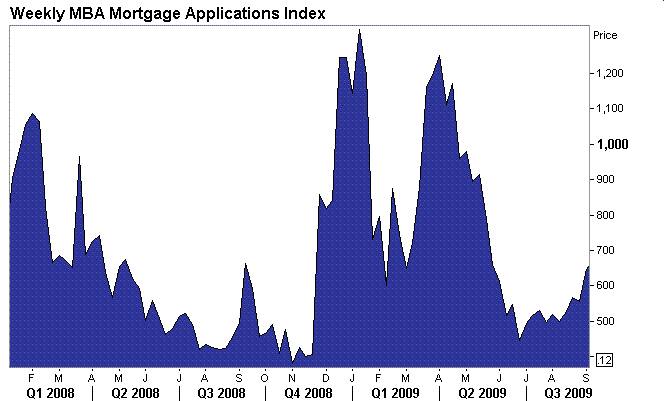Demand for mortgage loans and refinancing surged last week, spurred by a drop in mortgage rates, an industry survey said. Purchases also saw the largest weekly gain since early April.
The Mortgage Bankers Association (MBA) said interest rates for a 30-year loan moved down 13 basis points to 5.02% in the week ending September 2, causing demand for total new loan applications to hit their highest level since late May.
The Market Composite Index ― which tracks the volume of mortgage applications ― climbed by 17% in the week, pushing the annual gain to a dramatic +64.5%.

Applications to refinance accounted for nearly 60% of new loans, as they jumped 22.5% in the week, marking the biggest weekly gain since mid-March. Over the past four weeks, refinance applications have been moving up nearly 10% per week, while the 4-week average for total applications is up 7%.
Pressure for prospective buyers to cut a deal now is building, as the government’s $8,000 tax credit for first-time home buyers expires at the end of November.
That pressure helps to explain why the MBA’s Purchase Index resumed its upward path after skidding 0.5% last week. Purchases increased 9.5% in the period ― the largest weekly gain since early April ― causing the index to match its recent peak in early January. The 4-week average is also up 3.3%.
Across the country, mortgage rates are rapidly falling to meet the demand for new purchases. Yesterday, a report from Zillow.com the state average is below 5.30% ― an historically low rate ― in all 50 states. Lenders in Georgia offer the lowest rates with an average of 5.02%, while rates in Illinois and Wisconsin are currently the highest at 5.26%.
Not all recent news in the housing market is positive though. This morning, The Washington Post reported that another wave of foreclosure looms due as “hundreds of thousands of risky home loans known as option adjustable-rate mortgages reset to significantly higher payments that could force borrowers to fall behind.”
Citing a report by Fitch Ratings, the Post said close to 70% of the $189 billion in outstanding option ARMs will reset by 2011, which could mean increased foreclosures will still be front page news for months to come.







